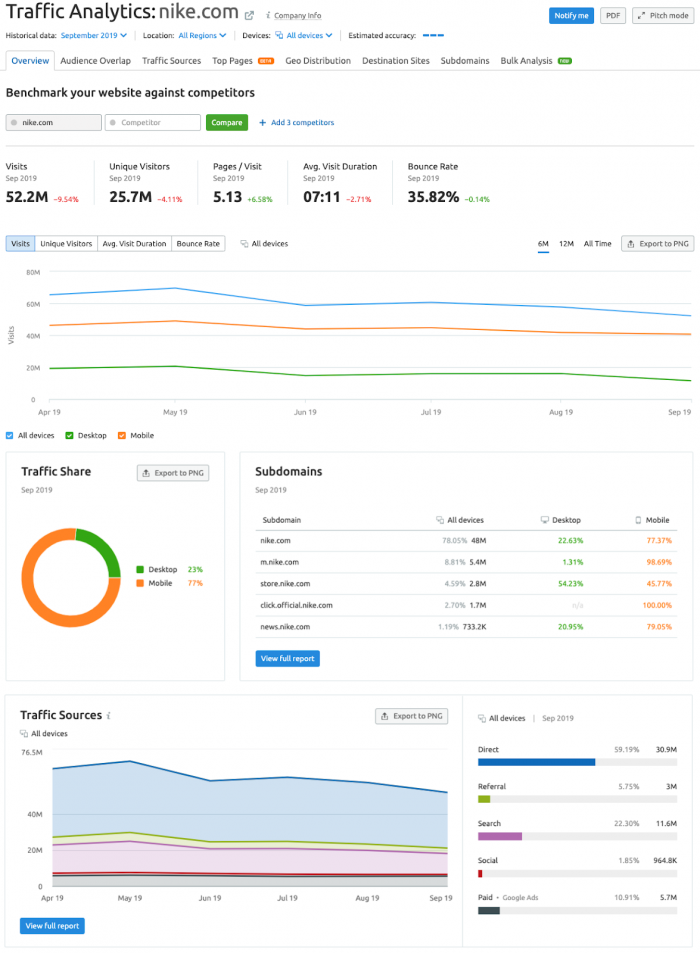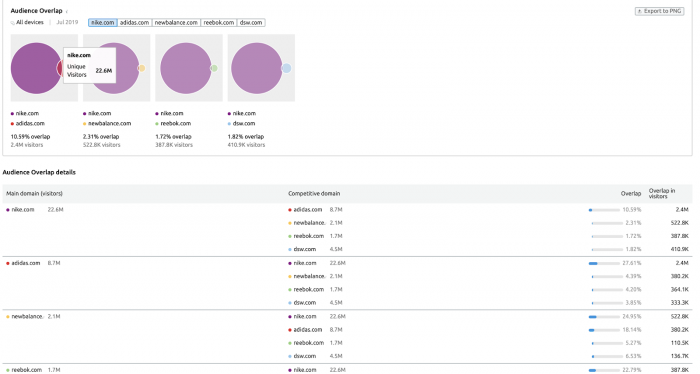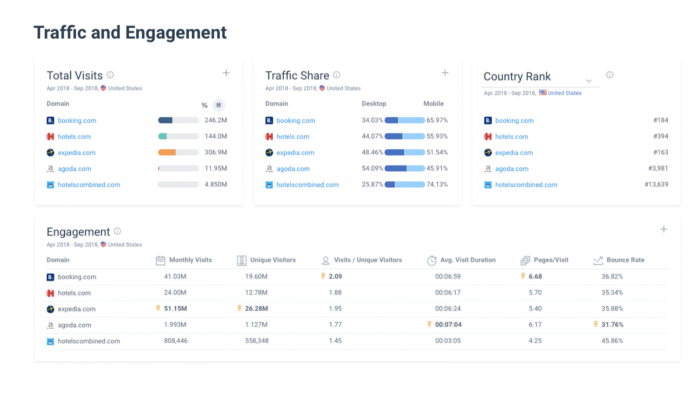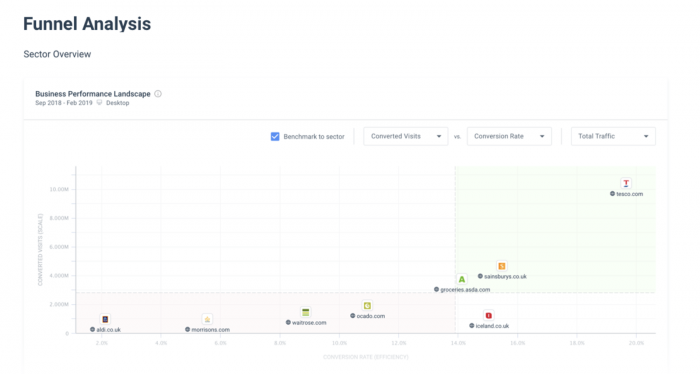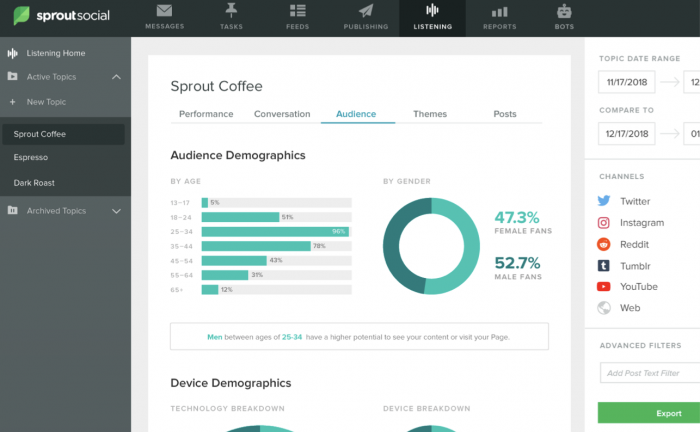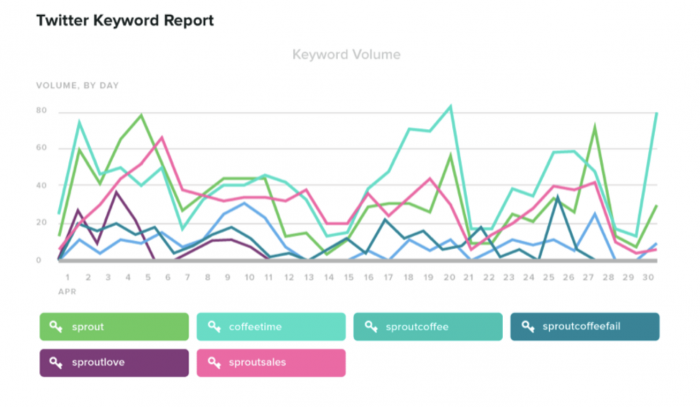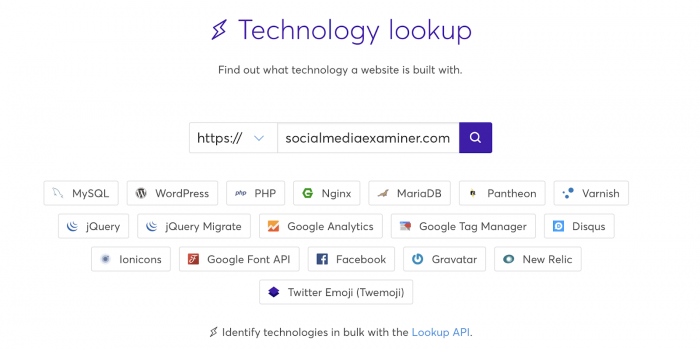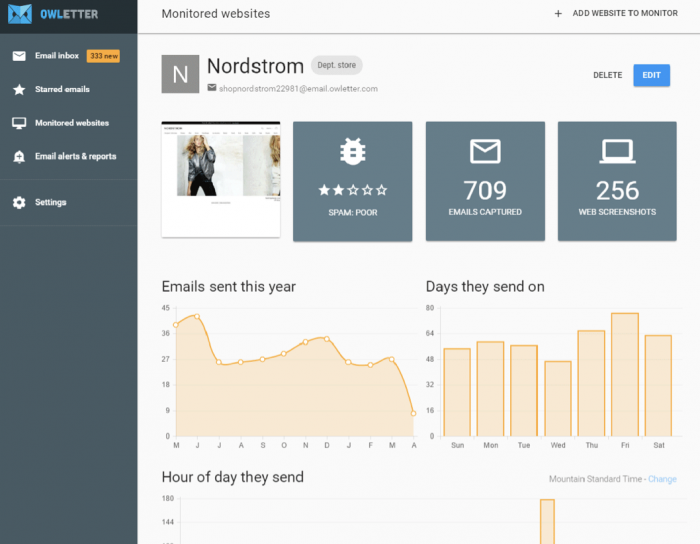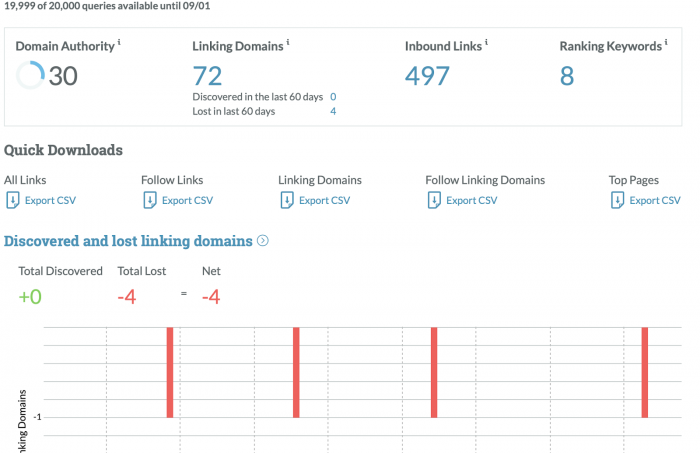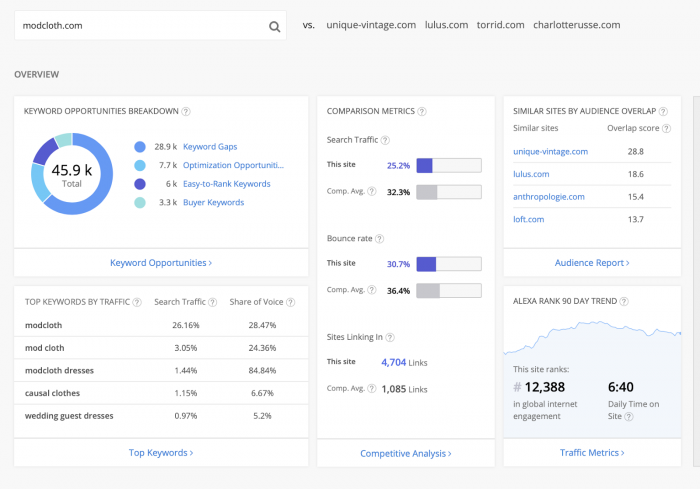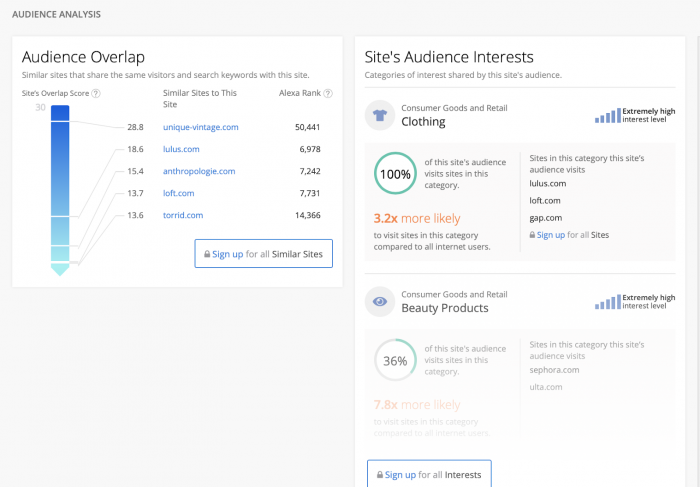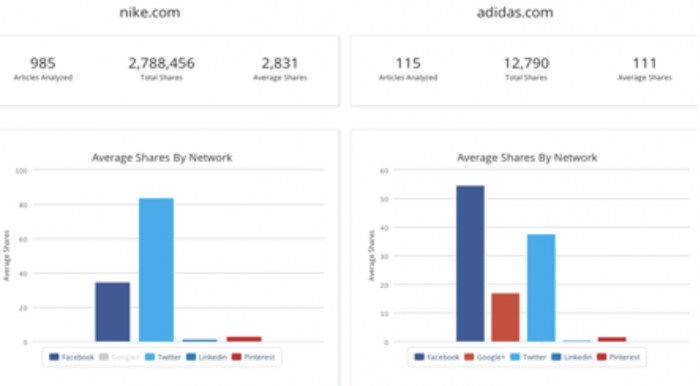The Best Competitive Intelligence Tools You Should Consider Using
Last updated on May 16, 2023 by João Aguiar 10 min readWhen it comes to marketing and our online presence, we don’t just live in bubbles where our actions are the only ones that impact us; instead, our businesses are heavily influenced by both the overall market and what our competitors are doing, too.
It’s essential to understand how we fit into the puzzle, what we can do differently, and how to outperform what our competitors are currently doing.
Competitive analysis tools can help you assess all of this, giving you insight into who is outperforming you and what you can do to change that.
In this post, I’ve carefully selected 8 strong, well-rounded tools that will yield the most data possible.
These tools are particularly valuable to experienced marketers, as they can be trusted for accuracy, provide regular updates, and save you a ton of time in the process.
List of The Best Competitive Intelligence Tools
1. SEMrush Traffic Analytics
Most of the tools on this list are really great at one or two things, with a few offering stronger suites of tools.
SEMrush, however, is proud to offer a truly extensive suite of marketing tools that can provide invaluable competitive analysis.
For competitor research and benchmarking, a real must is SEMrush Traffic Analytics.
It is an all-in-one solution that quickly gives you insight into any other company’s website traffic stats.
You can benchmark yourself against competitors or compare your rivals with each other.
You’ll immediately see strong visualizations (that can be exported to PNG) and get a clear idea of the competition: from traffic overview to performance of specific pages.
SEMrush Traffic Analytics can show you a number of different metrics, including full mobile stats.
You can see the top landing pages from your site and your competitors, and compare metrics like visit duration, numbers of visitors, bounce rate, traffic sources, and traffic by geography.
You can also see how your audiences are overlapping with your competitors. Subscribers get access to historical data starting in April 2016.
In addition to SEMrush Traffic Analytics, SEMrush offers a full range of competitive intelligence tools.
You can see what keywords your competitors are ranking for organically and for paid advertising and how much they’re paying.
Check out their backlink profile, and use the social analytics features to see how they’re performing on different social channels.
All of this together creates a true big-picture view, which is so much more valuable than just a few simple metrics.
Why this tool made our list: SEMrush Traffic Analytics is the most useful for comparing specific competitors, researching new markets and niches, and finding ground for strategic and tactical moves.
The tool includes features like Audience Overlap and Top Pages which are quite rare for the niche.
Furthermore, SEMrush offers the most well-rounded and extensive suite of tools to date.
By the way, you can SEMrush Traffic Analytics right now. Follow the link to get your free 14-day trial.
2. SimilarWeb
SimilarWeb is probably the most used tool to compare website traffic.
It provides a strong analytics program that can help you do everything from identify emerging competitors in your industry to identify what strategies they may be using.
Just make sure that your target markets are included in your subscription, as each country database is purchased separately.
In addition to keeping an eye on your own performance, you can see how your metrics are aligning with your competitors, getting a better understanding of how you measure up.
This platform shows you where you stand against your competitors in terms of referral traffic, marketing channels, overall engagement, search traffic and terms, and more.
SimilarWeb also has a strong audience insights platform, giving you a better understanding of what niches of the overall target audience you’re getting and how it compares to the traffic and audience segments your competition is receiving.
This is key, because it can highlight the key sections of your audience that you may be missing and give you some insight on how to better connect with them, especially since you can also keep an eye on whose funnels are most successful at driving conversions, too.
Note: choose the type of subscription carefully, as the basic plan will only give you access to the 12-month data.
Why this tool made our list: SimilarWeb’s overall analytics are strong, but their most unique feature is the funnel visualization. Being able to see how you’re driving conversions — and who is more successful — is incredibly valuable.
Read also: SimilarWeb vs SEMrush Traffic Analytics – Website Traffic Comparison Case Study
3. Sprout Social
Sprout Social has in-depth competitor analytics tools for data and intelligence with a strong basis in social data, including social listening.
This competitive analytics platform can tell you a great deal about what people are saying about your competition, along with helping you to keep an eye on what they’re up to.
You can also glean access into information about their top performing social posts, overall engagement, and see their growth on social.
This can give you a condensed version of their overall content strategies, showing you what they’re discussing and what your audience is finding engaging and how your content is holding up.
The downside here: Sprout Social is a social-heavy tool, so while it offers more valuable insights into social data that most of the other tools don’t, it doesn’t hold a candle to the data you can get from overall site analytics if that’s what you’re looking for.
Why this tool made our list: Sprout Social’s social listening tool and social analytics can help you assess what people are saying about your competitors and what they’re doing on social. You’ll gain insights into their strategies and what people are saying about them overall.
4. Wappalyzer
Wappalyzer is a hyper-focused tool, and it only does one job but it does it definitively well.
This browser add-on will instantly show you the specific technologies that are being used on the site you’re currently viewing.
The extension is easy to use, and the insight it can offer can’t really be found in many other resources on this list.
Take a look at what technology and extensions your competitors are using!
You may notice, for example, that all of your competitors ranking well in the SERPs are using SEO plugins to optimize their pages for specific keywords.
Or, you may find that those with the highest number of sales have integrations with email software like Mailchimp that can distribute autoresponder campaigns.
Why this tool made our list: Wappalyzer helps you see what specific technologies other sites are using and then improve your own results in terms of improved traffic, engagement, and even sales.
5. Owletter
This is another highly specialized tool, but it looks at something hardly any other CI service does.
Owletter is an email competitor research tool, giving you a deep-dive of info on what offers your competitors are running, when their sales are running, how they announce net products, and even what subject lines they’re using to boost email open rates.
This can tell you a lot about what your audience wants to see and what they respond to.
Why this tool made our list: With Owletter, you can gain detailed insight into what’s working in your competitors’ email campaigns and what strategies they’re currently using.
6. Moz
Moz has a strong competitive research suite of tools, offering detailed information on their keyword usage, domain authority, position ranking, and more.
Their analytics tool is one of the big ones, and it’s well-established in the industry.
Its audit capabilities can give you plenty of data on what’s happening on your site (technically and strategically) and what’s going on in your competitors sites.
The platform also offers cursory social media analytics, giving you a big-picture view of what’s happening.
This is a solid tool for crawling your competitors’ sites and comparing them to your own.
Included in the suite is the ability to check your competitor’s backlink profile and look for the other sites (and other factors) that may be improving or hurting their domain authority.
Since Moz developed the domain authority score, this is all tied in seamlessly, giving you a clear look at how well everything fits together.
Why this tool made our list: Moz has an extensive suite of tools that can give you insight into what your competitors are doing both strategically and technically.
The best feature is the ability to see how your competitors’ backlink profiles impact their domain authority.
7. Alexa
Alexa is an analytics program from Amazon that has some great audience research features.
This tool is lightning-fast, and will show you how each site you’re searching for holds up against their industry’s standards.
You can see how they compare in site traffic, bounce rate, linking, and ranking overall.
The tool also recommends several tools with audience overlap, so you may even be able to identify new competitors you didn’t know you had and what channels are driving the most traffic to each one.
Alexa also has a ton of keyword information, showing you which are driving traffic to other sites, giving you new ideas for content.
This is closely integrated with their audience and demographic data, which may be among the most advanced on the list.
See your competitors’ audience’s interests, how much overlap you have with different competitors, and how they’re engaging with the site.
Why this tool made our list: Alexa is strong overall, but the audience details are the reason why you should choose this tool.
The audience overlap feature is useful, and its data is deeper than some surface-level demographics.
8. BuzzSumo
BuzzSumo is a content-oriented competitor analysis tool, and it’s great for helping you identify what your audience really wants to see in terms of topics for blog posts, lead magnets, and more.
You can use this tool to identify new competitors and see what they’re doing with their content marketing.
You can see how long their blog posts are, what types of mediums are being used, and quickly assess the top-performing content in your industry.
Since content can tell you a great deal about your audience, their pain points, and how to attract them to your site, this can be incredibly valuable.
Why this tool made our list: If you want to focus on content-oriented competitive intelligence, BuzzSumo is a tool for you.
Bonus: Quick Tips to Using Competitor Research
These 8 competitor analysis tools are all exceptionally useful, but in order to get true value from them, you need to understand how to take the data you’re gaining and leverage it to your advantage.
The key will be to use the metrics you’re seeing and look at what’s driving them.
You won’t simply want to see that your competitor is getting more traffic via search than you and leave it at that; you want to do some digging into their keywords and strategies to understand why.
Here are a few specific ways you can use what you learn in your competitor research to improve your own site’s performance and potentially even outperform them:
- Examine their site traffic and then look at factors like their backlink profile, SERP positioning, and the keywords they’re bidding on to understand which are helping them to succeed. Website traffic analysis is key to getting a general overview of what each company is doing in the industry and then being able to assess their strategies and tactics in detail.
- Leverage your competitor’s best keywords for yourself, outbidding them in PPC campaigns if you’re unable to beat them organically.
- Take a look at your competitors’ backlink profiles; you may find that they’re more diverse, and that you get a few ideas about new publications you can submit guest posts to. You can also develop your backlink connections into real co-marketing partnerships, establishing who is linking to content into your industry and find ways to establish relationships with them.
Conclusion
Having strong competitive intelligence knowledge is an important part of all marketing work, and these competitor analysis tools will help you do exactly that.
Each of these eight tools was carefully selected for their value and the sheer amount of data they can offer brands who want to improve their positioning online.

João Aguiar
Head of Digital at Mobidea
João is the Editor-in-Chief at Mobidea Academy, a tech player, dynamic, proactive, and fun! When he's not focusing on his role, he enjoys eating tasty food.
Affiliate tracking platforms allow you to keep track of your campaigns and optimize to increase affiliate marketing profits!
Check our list of the best push notification ad networks!
Discover the best TikTok ads spy tools that can help you stay ahead of the competition!

